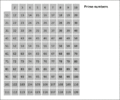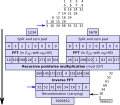also co-invented the Berlekamp–Rabin algorithm, Berlekamp–Zassenhaus algorithm, and the Berlekamp–Van Lint–Seidel graph. Berlekamp had also been active...
14 KB (1,318 words) - 05:40, 21 July 2025
In number theory, Berlekamp's root finding algorithm, also called the Berlekamp–Rabin algorithm, is the probabilistic method of finding roots of polynomials...
12 KB (2,006 words) - 20:25, 19 June 2025
1987, Rabin, together with Richard Karp, created one of the most well-known efficient string search algorithms, the Rabin–Karp string search algorithm, known...
20 KB (1,633 words) - 22:55, 7 July 2025
The Miller–Rabin primality test or Rabin–Miller primality test is a probabilistic primality test: an algorithm which determines whether a given number...
38 KB (5,639 words) - 20:26, 3 May 2025
finding square roots modulo prime numbers. In 1970, Elwyn Berlekamp introduced a randomized algorithm for efficiently computing the roots of a polynomial over...
33 KB (4,248 words) - 07:12, 21 July 2025
The Tonelli–Shanks algorithm (referred to by Shanks as the RESSOL algorithm) is used in modular arithmetic to solve for r in a congruence of the form r2...
19 KB (3,751 words) - 01:15, 9 July 2025
Sieve of Eratosthenes (category Algorithms)
In mathematics, the sieve of Eratosthenes is an ancient algorithm for finding all prime numbers up to any given limit. It does so by iteratively marking...
24 KB (3,053 words) - 20:26, 5 July 2025
modulo a prime number Berlekamp's root finding algorithm Cipolla's algorithm Tonelli–Shanks algorithm Multiplication algorithms: fast multiplication of...
72 KB (7,951 words) - 17:13, 5 June 2025
Euclidean algorithm also has other applications in error-correcting codes; for example, it can be used as an alternative to the Berlekamp–Massey algorithm for...
126 KB (15,342 words) - 01:03, 25 July 2025
The Karatsuba algorithm is a fast multiplication algorithm for integers. It was discovered by Anatoly Karatsuba in 1960 and published in 1962. It is a...
13 KB (2,046 words) - 20:43, 4 May 2025
The binary GCD algorithm, also known as Stein's algorithm or the binary Euclidean algorithm, is an algorithm that computes the greatest common divisor...
17 KB (1,993 words) - 13:05, 28 January 2025
Primality test (category Asymmetric-key algorithms)
discovery of the Solovay–Strassen and Miller–Rabin algorithms put PRIMES in coRP. In 1992, the Adleman–Huang algorithm reduced the complexity to Z P P = R...
27 KB (3,833 words) - 09:23, 3 May 2025
Integer factorization (redirect from Prime factorization algorithm)
efficient non-quantum integer factorization algorithm is known. However, it has not been proven that such an algorithm does not exist. The presumed difficulty...
25 KB (2,977 words) - 21:02, 19 June 2025
The Schönhage–Strassen algorithm is an asymptotically fast multiplication algorithm for large integers, published by Arnold Schönhage and Volker Strassen...
26 KB (4,580 words) - 11:43, 4 June 2025
A division algorithm is an algorithm which, given two integers N and D (respectively the numerator and the denominator), computes their quotient and/or...
43 KB (5,900 words) - 04:46, 16 July 2025
Lenstra–Lenstra–Lovász (LLL) lattice basis reduction algorithm is a polynomial time lattice reduction algorithm invented by Arjen Lenstra, Hendrik Lenstra and...
15 KB (2,154 words) - 23:50, 19 June 2025
Solovay–Strassen primality test (redirect from Solovay-Strassen algorithm)
been largely superseded by the Baillie–PSW primality test and the Miller–Rabin primality test, but has great historical importance in showing the practical...
10 KB (1,518 words) - 08:52, 27 June 2025
multiplication algorithm is an algorithm (or method) to multiply two numbers. Depending on the size of the numbers, different algorithms are more efficient...
47 KB (6,886 words) - 11:27, 22 July 2025
theory, Williams's p + 1 algorithm is an integer factorization algorithm, one of the family of algebraic-group factorisation algorithms. It was invented by...
5 KB (831 words) - 21:06, 30 September 2022
theory, the Pohlig–Hellman algorithm, sometimes credited as the Silver–Pohlig–Hellman algorithm, is a special-purpose algorithm for computing discrete logarithms...
7 KB (1,035 words) - 18:44, 19 October 2024
Ancient Egyptian multiplication (redirect from Russian peasant algorithm)
ancient Egypt the concept of base 2 did not exist, the algorithm is essentially the same algorithm as long multiplication after the multiplier and multiplicand...
13 KB (1,410 words) - 22:03, 16 April 2025
and computer programming, the extended Euclidean algorithm is an extension to the Euclidean algorithm, and computes, in addition to the greatest common...
28 KB (4,467 words) - 20:39, 9 June 2025
Shor's algorithm is a quantum algorithm for finding the prime factors of an integer. It was developed in 1994 by the American mathematician Peter Shor...
40 KB (5,809 words) - 23:45, 1 July 2025
Pollard's rho algorithm is an algorithm for integer factorization. It was invented by John Pollard in 1975. It uses only a small amount of space, and...
13 KB (1,755 words) - 06:12, 18 April 2025
In computational number theory, the index calculus algorithm is a probabilistic algorithm for computing discrete logarithms. Dedicated to the discrete...
11 KB (1,763 words) - 17:23, 21 June 2025
Modular exponentiation (category Cryptographic algorithms)
modular multiplicative inverse d of b modulo m using the extended Euclidean algorithm. That is: c = be mod m = d−e mod m, where e < 0 and b ⋅ d ≡ 1 (mod m)...
21 KB (2,759 words) - 02:20, 29 June 2025
Pollard's rho algorithm for logarithms is an algorithm introduced by John Pollard in 1978 to solve the discrete logarithm problem, analogous to Pollard's...
7 KB (1,187 words) - 18:02, 2 August 2024
Factorization of polynomials over finite fields (category Polynomial factorization algorithms)
is Berlekamp's algorithm, which combines stages 2 and 3. Berlekamp's algorithm is historically important as being the first factorization algorithm which...
31 KB (4,636 words) - 07:47, 21 July 2025
Integer square root (category Number theoretic algorithms)
y {\displaystyle y} and k {\displaystyle k} be non-negative integers. Algorithms that compute (the decimal representation of) y {\displaystyle {\sqrt {y}}}...
26 KB (3,191 words) - 07:11, 19 May 2025
Dixon's factorization method (redirect from Dixon's algorithm)
(also Dixon's random squares method or Dixon's algorithm) is a general-purpose integer factorization algorithm; it is the prototypical factor base method...
13 KB (2,513 words) - 21:23, 10 June 2025








